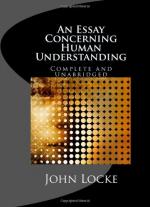
|
| Name: _________________________ | Period: ___________________ |
This test consists of 15 multiple choice questions and 5 short answer questions.
Multiple Choice Questions
1. What does Locke's illustration show?
(a) That hell is other people.
(b) That a man can be clear in will but unfree in action.
(c) That fate wears a human face.
(d) That a man can be deceived about his relation with other men.
2. What does Locke say allows us to see ourselves as free agents?
(a) Fate.
(b) Will.
(c) Determinism.
(d) Desire.
3. What happens to love over time, according to Locke?
(a) It leads to marriage and commitment in acts.
(b) Like other ideas, it fades unless it is renewed.
(c) It creates freedom.
(d) Unlike other ideas, it remains constant if it is true.
4. When does desire become action, in Locke's opinion?
(a) When it is unrequited.
(b) When it develops into a philosophy.
(c) When it merges with will.
(d) When it first stirs.
5. Where do pleasure and pain come from, according to Locke?
(a) Sensation.
(b) God.
(c) The mind.
(d) History.
6. What does Locke say men have freedom to do, in terms of language?
(a) Make them refer to any ideas.
(b) Communicate any feeling.
(c) Describe any experience.
(d) Create feelings in others.
7. What do cause and effect derive from according to Locke?
(a) Good and evil.
(b) Freedom and fate.
(c) Pain and pleasure.
(d) Cause and effect.
8. What modern movement did Locke prefigure in his arguments about philosophical language?
(a) Relativists.
(b) Ontology.
(c) Ordinary language philosophy.
(d) Deconstruction.
9. How does Locke resolve the contradiction between people who believe in free will and people who do not?
(a) He says that people have a choice whether to follow their wills.
(b) He says that the world has choices, even if people do not.
(c) He says that there is indeterminism on a sub-atomic level, that allows for free choice.
(d) He says that determinism is determined in free choices in every moment.
10. What does Locke say words refer to?
(a) Inner ideas.
(b) Experiences of pleasure and pain.
(c) Things in the world.
(d) Plants and animals.
11. According to Locke, the lack of what would make social life impossible?
(a) Manufacturing.
(b) Trade.
(c) Communication.
(d) Money.
12. What does Locke say each distinct idea is?
(a) A general idea.
(b) A simple idea.
(c) A word.
(d) An essence.
13. What do we have when a word can no longer be defined, according to Locke?
(a) The essence of an idea.
(b) Experience.
(c) Visions.
(d) Simple ideas.
14. What is the consequence of using words to refer to personal ideas, according to Locke?
(a) Madness.
(b) Art.
(c) Prophesy.
(d) Unintelligibility.
15. What branch of philosophy derives from Locke's ideas about pain and pleasure?
(a) Historicism.
(b) Existentialism.
(c) Utilitarianism.
(d) Socialism.
Short Answer Questions
1. What do we have when an abstract idea cannot be broken down?
2. What does Locke say liberty is aimed at?
3. Where does Locke say our ideas of morality come from?
4. What makes philosophers think that people do not have free will?
5. What does Locke describe as an abuse of words?
|
This section contains 504 words (approx. 2 pages at 300 words per page) |

|




